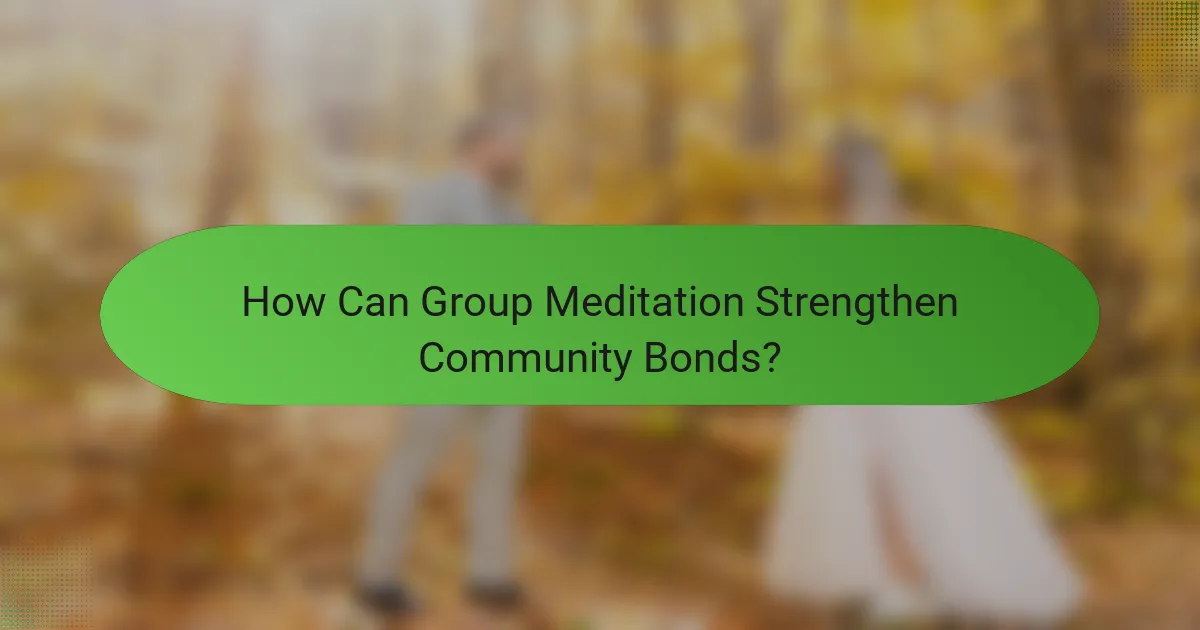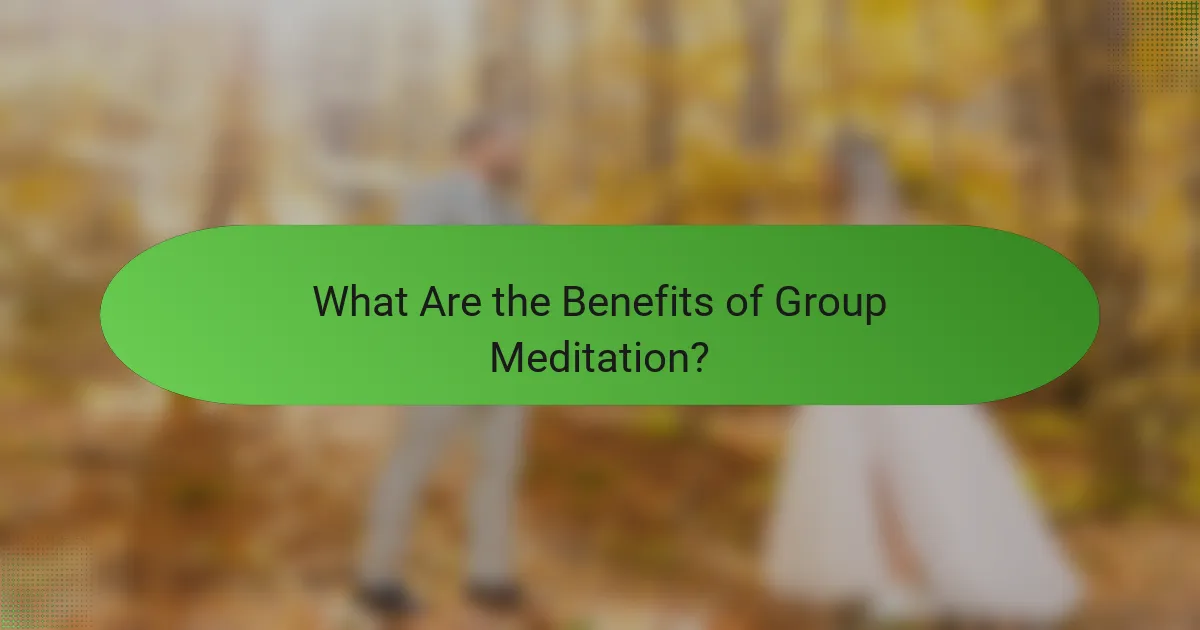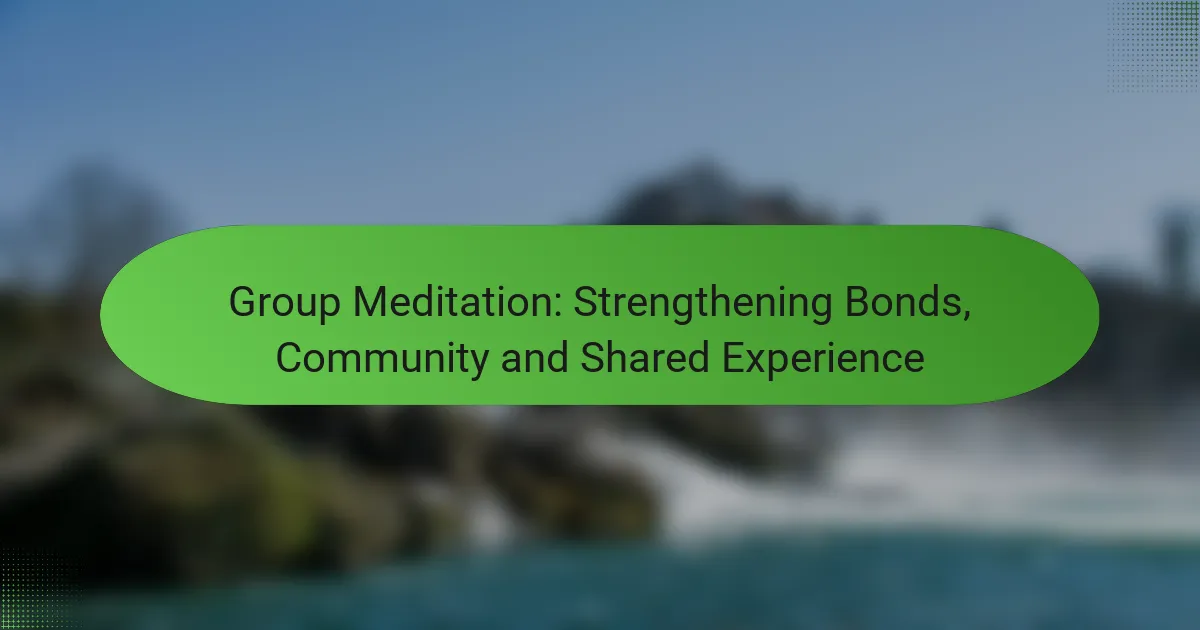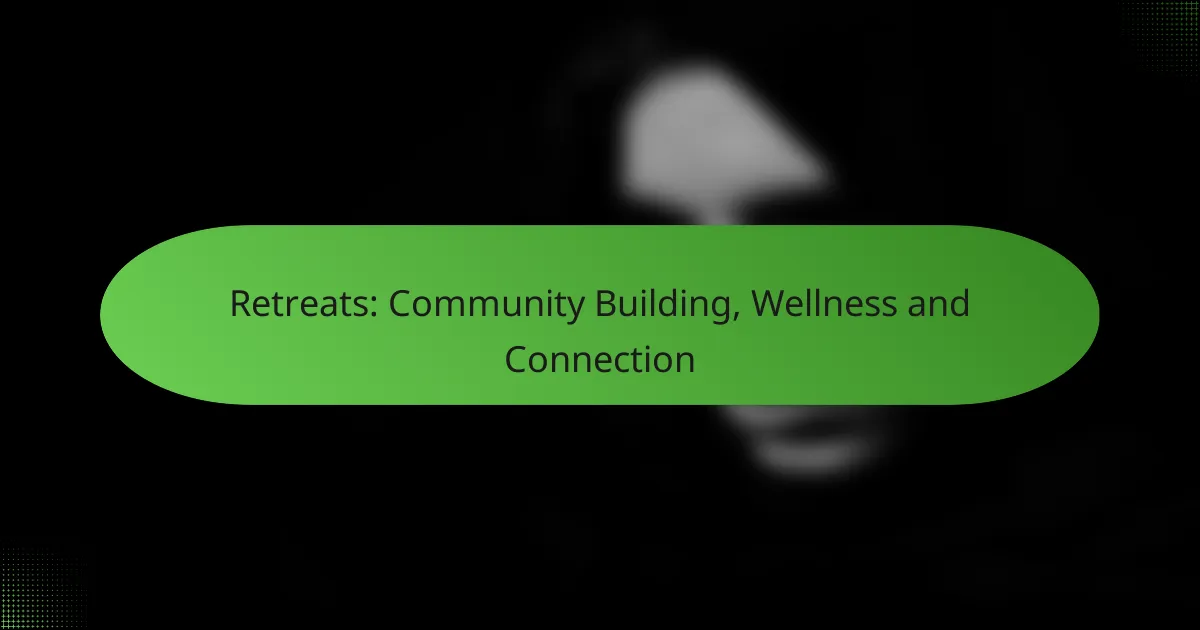Group meditation serves as a powerful tool for strengthening community bonds by fostering a shared experience of mindfulness and connection. Participants not only benefit from reduced stress and improved emotional health but also cultivate a sense of unity and belonging that enhances their relationships. By choosing the right format and environment, individuals can maximize the impact of their collective practice, creating lasting connections within the group.

How Can Group Meditation Strengthen Community Bonds?
Group meditation can significantly enhance community bonds by creating a shared space for individuals to connect on a deeper level. Through collective mindfulness practices, participants experience a sense of unity and belonging that fosters lasting relationships.
Shared experiences enhance connections
When individuals meditate together, they engage in a shared experience that can deepen their connections. This collective practice allows participants to feel a sense of camaraderie, as they navigate their thoughts and emotions in a supportive environment.
For example, a community center hosting weekly meditation sessions can attract diverse individuals who may not otherwise interact. Over time, these shared moments can lead to friendships and collaborative projects that benefit the entire community.
Fosters empathy and understanding
Group meditation encourages participants to cultivate empathy and understanding for one another. As individuals share their experiences during or after meditation, they gain insights into each other’s lives, fostering compassion and reducing judgment.
Practices such as guided meditations that focus on loving-kindness can enhance this effect, allowing participants to actively wish well for others. This practice can lead to a more harmonious community where members support each other’s growth and well-being.
Encourages collaborative growth
Engaging in group meditation can inspire collaborative growth among participants. As individuals share their insights and experiences, they can learn from one another, leading to personal and collective development.
For instance, a group may decide to implement community wellness initiatives based on the themes discussed during meditation. This proactive approach not only strengthens bonds but also promotes a culture of mutual support and shared goals.
Builds trust among participants
Regular group meditation sessions help build trust among participants, as they create a safe space for vulnerability. Sharing personal thoughts and feelings during these sessions can lead to stronger interpersonal relationships.
To maximize trust-building, facilitators should establish clear guidelines for confidentiality and respect. This ensures that participants feel secure in expressing themselves, ultimately leading to a more cohesive and supportive community environment.

What Are the Benefits of Group Meditation?
Group meditation offers numerous benefits, including reduced stress, improved emotional health, and a stronger sense of community. Engaging in meditation with others can enhance the overall experience, fostering connections and shared understanding.
Reduces stress and anxiety
Participating in group meditation can significantly lower stress and anxiety levels. The collective energy and support from fellow meditators create a calming environment that encourages relaxation.
Research suggests that group settings can amplify the effects of meditation, making it easier to enter a state of calm. Regular sessions can help individuals develop coping mechanisms for daily stressors.
Improves emotional well-being
Group meditation can enhance emotional well-being by fostering a supportive atmosphere. Sharing experiences and feelings with others can lead to increased empathy and understanding.
Many participants report feeling more connected and less isolated, which can contribute to improved mood and overall happiness. Engaging in this practice regularly may help individuals manage their emotions more effectively.
Enhances focus and clarity
Group meditation can sharpen focus and mental clarity. The shared intent of the group helps participants stay present and engaged, minimizing distractions.
Practicing together can also introduce new techniques and perspectives, enriching individual meditation practices. This collaborative approach often leads to deeper insights and enhanced cognitive function.
Promotes a sense of belonging
Joining a group meditation fosters a sense of belonging and community. Participants often form bonds through shared experiences, which can lead to lasting friendships.
This sense of connection is vital for mental health, as it combats feelings of loneliness and isolation. Being part of a community can motivate individuals to maintain their meditation practice and support one another in their journeys.

How to Choose the Right Group Meditation Format?
Choosing the right group meditation format involves considering factors like group size, meditation styles, and the experience of facilitators. Each of these elements plays a crucial role in ensuring a fulfilling and effective meditation experience.
Consider group size and dynamics
The size of the group can significantly impact the meditation experience. Smaller groups, typically ranging from 5 to 15 participants, often allow for more personal interaction and a sense of intimacy. Larger groups may foster a sense of community but can dilute individual attention.
Additionally, the dynamics of the group matter. Consider whether you prefer a more diverse group or one with similar backgrounds and experiences, as this can affect comfort levels and openness during sessions.
Evaluate meditation styles offered
Different meditation styles cater to various preferences and goals. Common styles include mindfulness, loving-kindness, and transcendental meditation. Research the styles offered by the group to ensure they align with your interests and objectives.
Some groups may focus on specific techniques or themes, such as stress relief or spiritual growth. Understanding these offerings can help you choose a format that resonates with your personal meditation journey.
Assess facilitator experience
The experience of the facilitator is crucial in guiding a successful meditation session. Look for facilitators with training in meditation techniques, as well as experience leading groups. This background can enhance the quality of the session and provide a supportive environment.
Consider checking reviews or testimonials from previous participants to gauge the facilitator’s effectiveness. A skilled facilitator can help navigate challenges and create a safe space for all participants, enhancing the overall experience.

What Are Popular Group Meditation Techniques?
Popular group meditation techniques include guided meditation, mindfulness meditation, transcendental meditation, and movement-based meditation. Each method offers unique approaches to fostering a shared experience and enhancing community bonds.
Guided meditation
Guided meditation involves a facilitator leading participants through a series of visualizations or relaxation techniques. This method is particularly beneficial for beginners, as the instructor provides direction and support, helping individuals stay focused and engaged.
In a group setting, guided meditation can create a collective atmosphere of calm, allowing participants to share in the experience. Sessions typically last from 20 to 60 minutes, making them accessible for various schedules.
Mindfulness meditation
Mindfulness meditation emphasizes being present in the moment and observing thoughts without judgment. In a group, participants often practice together, fostering a sense of community while cultivating individual awareness.
Sessions can vary in length, but many last around 30 minutes. Participants may engage in silent meditation or share their experiences afterward, enhancing connection and understanding among the group.
Transcendental meditation
Transcendental meditation (TM) is a specific technique that involves silently repeating a mantra to settle the mind into a state of profound rest. In group settings, TM can deepen the experience as participants meditate simultaneously, potentially amplifying the benefits.
Typically, TM sessions last about 20 minutes, and practitioners often meet regularly to maintain consistency. It’s essential to learn this technique from a certified instructor to ensure proper practice and understanding.
Movement-based meditation
Movement-based meditation incorporates physical activity, such as yoga or tai chi, to promote mindfulness and relaxation. This approach can be particularly engaging in a group, as participants move together, creating a shared rhythm and energy.
Classes usually range from 30 to 90 minutes and can accommodate various skill levels. It’s important to choose a style that resonates with the group, ensuring everyone feels comfortable and included in the practice.

Where to Find Group Meditation Sessions in Your Area?
Group meditation sessions can be found in various local venues and online platforms, making it easier to connect with others while practicing mindfulness. Look for wellness centers, community centers, and online platforms to join or discover sessions that fit your schedule and preferences.
Local wellness centers
Wellness centers often offer structured group meditation sessions led by experienced instructors. These sessions may vary in style, including guided meditations, mindfulness practices, and even yoga-integrated meditation. Check local listings or the websites of wellness centers to find schedules and pricing, which can range from free to around 20-30 USD per session.
When attending a session at a wellness center, arrive a few minutes early to settle in and familiarize yourself with the space. Bring your own mat or cushion if required, and be prepared to engage with fellow participants, as community interaction is often encouraged.
Community centers
Community centers frequently host group meditation sessions as part of their wellness programs. These sessions are typically more affordable, often charging minimal fees or even being free to residents. Look for bulletin boards or websites of local community centers to find upcoming meditation events.
Participating in community center sessions can foster a sense of belonging and connection with your neighbors. Be open to different meditation styles and consider joining a regular group to deepen your practice and relationships.
Online platforms like Meetup
Online platforms such as Meetup provide an excellent way to find group meditation sessions in your area. You can search for local groups based on your interests and availability, often with options for both in-person and virtual meetings. Membership is usually free, but some groups may charge for specific events.
When using platforms like Meetup, read reviews and check the group’s activity level to ensure a good fit. Engage with group members beforehand if possible, and be open to trying different styles of meditation to find what resonates with you.

What Are the Costs Associated with Group Meditation?
Costs for group meditation can vary widely based on location, type of session, and facilitator expertise. Generally, participants may encounter fees for classes, rental spaces, or materials, which can range from free community sessions to paid workshops costing several dollars per session.
Class Fees
Class fees for group meditation typically range from free to around $20 per session, depending on the instructor’s experience and the venue’s location. Many community centers or local organizations offer free or donation-based classes, while established studios may charge higher rates.
Space Rental
If a group organizes its own meditation sessions, costs may arise from renting a space. Rental fees can vary significantly, often falling between $50 to $200 per hour, depending on the facility’s amenities and location. It’s advisable to compare different venues to find the best balance between cost and comfort.
Materials and Resources
Some group meditation sessions may require materials such as cushions, mats, or guided meditation recordings. These items can add to the overall cost, typically ranging from a few dollars for basic supplies to over $100 for high-quality equipment. Participants should consider sharing resources to minimize individual expenses.
Travel Expenses
Travel costs can also impact the overall expense of attending group meditation sessions, especially if the location is not easily accessible. Participants should factor in transportation costs, which may include public transit fares or fuel expenses, when planning to join a group. Carpooling or using public transport can help reduce these costs.



